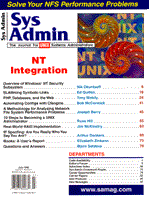
New MessagesPlease send letters via email to saletter@mfi.com. I have written once before to express my disappointment in the lack of editing for the technical content of Sys Admin Magazine. I have been a loyal subscriber since issue 1, but I'm finding it harder and harder to justify the expense of subscribing. I feel I must point out, again, how lacking an article is in technical accuracy. The article I'm referring to is Mark Nassal's "Security - A Multi-Tiered Approach, Part 2" in the March 1998 edition. Listed below are some of the more glaring inaccuracies contained in this article:
share -F nfs -o ro
should read:
share -F nfs -o ro /cdrom
These technical errors provide a major disservice to your readers. I urge you to take the steps necessary to provide for better technical review of future articles. If not, I will have no choice but to terminate my subscription.
Sincerely,
Thanks for your comments; I appreciate your help. When I first received Mr. Campbell's email, I told him I would print it in the "New Messages" column. Two months later he wrote back to express his understandable dismay at not seeing it. I had been saving his letter until I had enough copy to fill this space, and only now have I received any additional letters. So, once again, I'd like to invite you all to send me criticisms, compliments, ideas, jokes, or whatever. Without those types of comments, it is difficult for us to know if we're fulfilling your expectations for this magazine. Let me know what you like and don't like, and I'll consider your suggestions. My email address is: aankerholz@mfi.com. Write to me!
Thanks for your time.
To: saletter@mfi.com I was stopped short when you stated that all UDP packets should be blocked. There is a whole class of time-dependent data that is made available through UDP multicasting. The destinations are unknown by the broadcaster. I know that our company could not perform its work without UDP data, and your statement should be qualified to reflect this possibility.
Dear Mr. Marks, If you really need one or more specific UDP-based services, the best thing to do is build an isolated network with machines that use this service. Make sure it is separate from your regular network. In this way, you can protect your corporate data and systems and still use the services.
Hope that helps,
In response to Bjorn Satdeva's (June) request for updated information about GNU compilers, David C. Bishop says: Links for GCC for Sun systems including x86 platforms can be found at:
http://smc.vnet.et/solaris_2.5.html
|